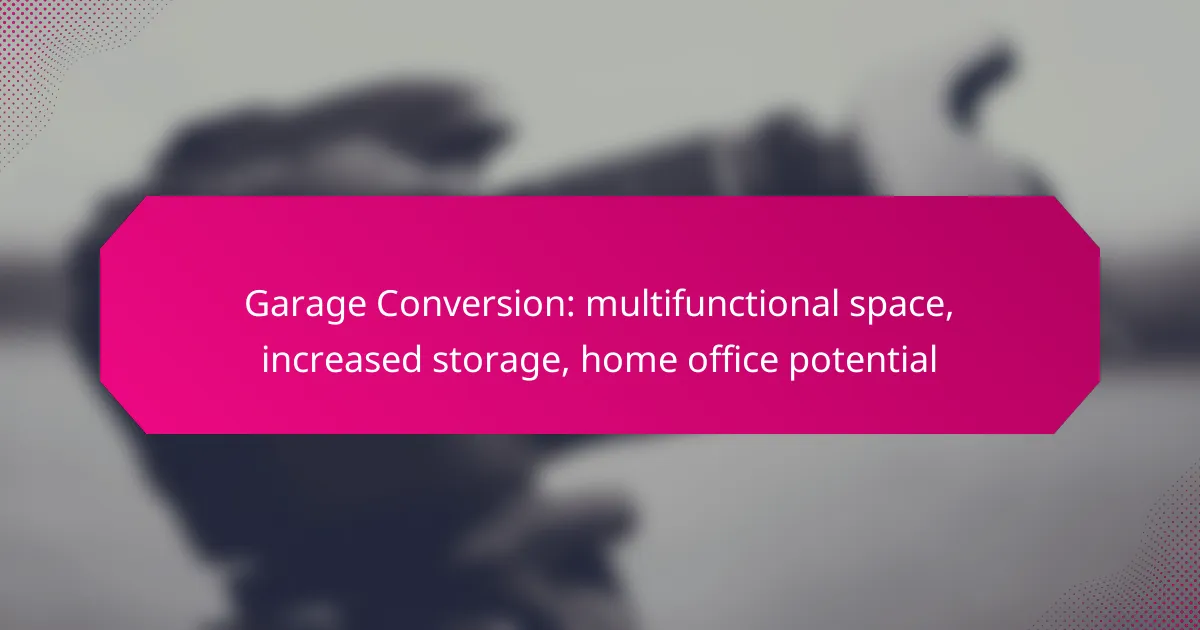A garage conversion can turn an underused area into a multifunctional space that enhances your home’s utility and value. Whether you envision a home office, gym, or creative studio, this transformation not only maximizes storage but also provides practical solutions for decluttering your living environment.

How can a garage conversion create multifunctional spaces in the UK?
A garage conversion can effectively transform underutilized space into multifunctional areas, enhancing both utility and value in your home. By reimagining your garage, you can create spaces that serve various purposes, such as a home gym, guest accommodation, or a creative studio.
Home gym setup
Converting your garage into a home gym allows for a dedicated fitness space without the need for a gym membership. Consider installing rubber flooring, mirrors, and adequate lighting to create an inviting workout environment.
When planning your gym, think about the equipment you want. Basic setups might include free weights, a treadmill, or resistance bands. Ensure there’s enough space to move freely and consider ventilation options to keep the area comfortable during workouts.
Guest accommodation
Transforming your garage into guest accommodation can provide a private space for visitors while adding value to your property. This setup typically requires insulation, heating, and possibly a small bathroom to ensure comfort.
When designing the space, focus on creating a welcoming atmosphere with comfortable bedding and essential amenities. You might also want to consider soundproofing to enhance privacy for both guests and household members.
Creative studio
A garage can be an ideal location for a creative studio, whether for art, music, or crafting. The spacious environment allows for the freedom to work on projects without the constraints of indoor living spaces.
To set up a creative studio, ensure you have good lighting, storage for materials, and a work surface that suits your needs. Depending on your craft, consider adding soundproofing if you’re working with instruments or loud tools, and ensure proper ventilation for any materials that may emit fumes.

What are the benefits of increased storage through garage conversions?
Increased storage through garage conversions provides homeowners with practical solutions to declutter and organize their living spaces. By transforming a garage into a multifunctional area, you can maximize storage capacity while enhancing the overall utility of your home.
Maximized space utilization
Garage conversions allow for better space utilization by repurposing an underused area into functional living space. This can include adding shelves, cabinets, or even creating designated zones for different activities, such as a workshop or hobby area.
Consider incorporating vertical storage solutions to take advantage of height, which can significantly increase your storage capacity without requiring additional floor space. This approach is particularly useful in smaller homes where every square foot counts.
Organized storage solutions
Converting your garage can lead to organized storage solutions that cater to your specific needs. Custom-built shelving and storage units can help you categorize items, making it easier to find what you need when you need it.
Utilizing clear bins and labels can further enhance organization, allowing you to quickly identify contents without rummaging through boxes. This method not only saves time but also reduces stress associated with clutter.
Enhanced property value
Garage conversions can significantly enhance your property’s value by increasing usable square footage. Potential buyers often view additional living space as a major advantage, particularly if it includes well-designed storage solutions.
In many markets, a well-executed garage conversion can yield a return on investment of 70% to 80%. This makes it a smart financial decision for homeowners looking to improve their property’s appeal and marketability.

How can a garage be transformed into a home office in the UK?
A garage can be converted into a functional home office by focusing on layout, comfort, and aesthetics. This transformation allows for a dedicated workspace that enhances productivity while utilizing existing space efficiently.
Designing an ergonomic workspace
Creating an ergonomic workspace involves selecting furniture that promotes good posture and comfort. Invest in an adjustable desk and an ergonomic chair to support long hours of work. Ensure that your computer screen is at eye level to reduce strain on your neck and eyes.
Consider the layout of your office. Position your desk near power outlets and ensure there is enough space for movement. Aim for a clutter-free environment by incorporating storage solutions like shelves or cabinets to keep essential items organized.
Incorporating soundproofing
Soundproofing is crucial for maintaining focus in a home office. Use acoustic panels on the walls to absorb noise and consider adding a soundproof door to minimize distractions from outside. Thick carpets or rugs can also help dampen sound within the space.
For added sound insulation, seal any gaps around windows and doors with weather stripping. This not only reduces noise but also improves energy efficiency, which can be beneficial in the UK’s varying climate.
Utilizing natural light
Maximizing natural light can enhance mood and productivity in your home office. If possible, position your desk near a window to take advantage of daylight. Use light-colored paint and reflective surfaces to brighten the space further.
Consider installing skylights if your garage structure allows for it. This can significantly increase the amount of natural light and create a more inviting atmosphere. However, be mindful of glare on screens; using blinds or shades can help control light levels effectively.

What are the costs associated with garage conversions in the UK?
The costs of garage conversions in the UK can vary widely based on factors such as size, materials, and the complexity of the project. Generally, homeowners can expect to spend anywhere from £5,000 to £30,000, depending on the desired finish and functionality.
Average conversion costs
On average, a basic garage conversion may start around £5,000, while more extensive renovations that include plumbing or electrical work can reach £30,000 or more. The typical range for a standard conversion is between £10,000 and £20,000, which often includes insulation, flooring, and basic fixtures.
Additional costs may arise from planning permissions or building regulations, particularly if the garage is attached to the house or if structural changes are needed. Always consult local regulations to avoid unexpected expenses.
Cost-saving tips
To save on conversion costs, consider doing some of the work yourself, such as painting or installing fixtures. This can significantly reduce labor costs. Additionally, sourcing materials from local suppliers or second-hand stores can help keep expenses down.
Another effective strategy is to plan the conversion during off-peak seasons when contractors may offer lower rates. Always obtain multiple quotes to ensure you are getting a competitive price.
Financing options
Homeowners can explore several financing options for garage conversions, including personal loans, home equity loans, or remortgaging. Personal loans typically offer quick access to funds but may have higher interest rates compared to home equity loans, which use the property as collateral.
It’s advisable to assess your financial situation and compare different lenders to find the best terms. Some homeowners may also consider government grants or schemes aimed at improving energy efficiency, which can offset some costs.

What regulations must be considered for garage conversions in the UK?
When converting a garage in the UK, it’s essential to consider various regulations, including planning permission, building regulations, and permitted development rights. Understanding these requirements will help ensure your project is compliant and successful.
Planning permission requirements
In many cases, converting a garage may require planning permission, especially if the conversion alters the structure significantly or changes its use. Local councils have specific guidelines, so it’s crucial to check with your local authority before starting any work.
Common factors that may trigger the need for planning permission include the addition of windows, external alterations, or if the garage is part of a listed building. Always consult your local planning office for tailored advice.
Building regulations compliance
Building regulations ensure that any conversion meets safety and structural standards. This includes aspects such as insulation, fire safety, and electrical installations. Typically, you will need to submit a building notice or full plans to your local council.
Key areas to focus on include ensuring adequate ventilation, proper drainage, and compliance with energy efficiency standards. Engaging a qualified builder familiar with these regulations can help streamline the process.
Permitted development rights
In some cases, garage conversions may fall under permitted development rights, allowing you to proceed without full planning permission. However, this is subject to specific conditions, such as not exceeding certain size limits or altering the garage’s external appearance significantly.
It’s advisable to verify your property’s permitted development rights through your local council, as these can vary by area. Understanding these rights can save time and resources during your conversion project.
